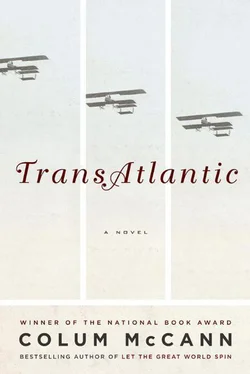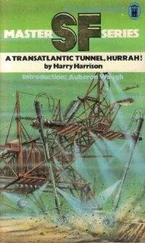Lord, it was a tangled web. One he would do well to sleep upon. One that needed an eternity of rest.
Still, he had grown to like them: the politicians, the diplomats, the spin doctors, the civil servants, the security men, even the loudmouths outside the gates. All of them with their own particular music. A certain generosity to them. All the dirty laundry somehow made eloquent. He was told once that any good Irishman would drive fifty miles out of his way just to hear an insult — and a hundred miles if the insult was good enough. The self-deprecation. The effacement. The awareness. There was something about the endless wrangling that has caught him in the glue pot and kept him there. The confounded intricacies. The edges of endeavor. The fascination with the impossible. He wanted to stay alert to what might be learned. And there was always a key in the anonymous moment. The women in the canteen. They nodded at him and caught his eye. The sad smile. The generous delusion. The lean forward. God bless you, Senator, but it’s a fool’s errand . Well, be that as it may, but I’ll still take the part.
HE WAS NOT beyond knowing that they thought him — when he first arrived — a quiet patsy. The Arab. The Yank. The Judge. Your Harness. Mohammed. Mahatma. Ahab. Iron Pants. They even called him, for some reason, the Serb. He wasn’t interested in playing himself Irish or Lebanese. Not for him the simple ancestral heart: he wanted to make himself the smallest continent possible.
Still, he was sure some of them wanted a slice of anger from him. To stumble somehow. To say the wrong thing. So they could apportion the blame away from themselves. But he figured out ways to fade into the background, stuck to silence, looked over the rim of his glasses. He disliked his own importance in the process. It was the others who had brought the possibility here: Clinton, Reynolds, Hume, Major. He just wanted to land it. To take it down from where it was, aloft, like one of those great lumbering machines of the early part of the century, the crates of air and wood and wire they somehow flew across the water.
A RED EYELID of sun out the window. The vaguely scattered morning clouds. London below. The hum and flood of plane lights. His feet have swollen during the flight. In the overhead locker he reaches for his sweater.
He is vaguely embarrassed that Heather dresses him these days. She knows a Persian tailor who double-breasts his suits. It took a little while to step into the crease. Even the very word bespoke . The sweaters are from Cenci or some such place. Something comforting in them. A small surrendering to memory. Odd that desire is made true by distance. He can pull on the sweater and almost be back on Sixty-Seventh Street. Odd, too, how a life can so easily reshape itself. Perhaps the failure that irks him the most is the original marriage. It simply didn’t work out. They tried, he and his first wife, they hung on, they failed, what was broken was broken. Ashes do not become wood. What he feared early on was the idea that his grown daughter might see him in his new suit and ties, and that she would say nothing at all, that the silence would go right to the core of failure.
He hitches his jacket up on his shoulders. Onwards. Away. He is sixth off the plane. He allows the others to go ahead. His body still vaguely belonging to the cabin. That air in the back of his calves.
Halfway down the corridor he is surprised by a hand on his elbow. Bombing? Murder? Broken ceasefire? But it’s a young man, blue-eyed with a nose ring. Must have been sitting at the front of the plane. Vaguely familiar. Maybe a pop star of sorts. Or someone from the movies. Good luck, Senator, we’re praying for you . In an English accent. Odd to think of the young man praying at all. Mostly it was the older women of Northern Ireland who said that to him. Adjusting their hairnets. Wrapping their fingers white with beads.
He shakes the young man’s hand and strides along the corridor. But Lord, he hates this walk. Who will be there to meet and greet him? What sort of security detail? It always gets heavier on this side of the pond. Simply to walk him to another terminal. He can make out their shapes at the end of the walkway. A young woman with short blond hair lifts her hand in greeting: he recalls her name though he has only met her twice. Lorraine. And two new security men. Coming towards him briskly. No news on their faces, no sudden collapses. No apparent grief. Thank God for that.
— How was your flight, sir?
— Wonderful, thank you.
A small lie of course, but why whine? She’ll hardly whisk out a pillow for him. They move swiftly down the stairs, out to the waiting car, towards Terminal Two.
— Sorry, sir, but your next plane’s delayed thirty-five minutes, she says.
Lorraine has, on her belt, space for three phones. She juggles them with style and grace, hooks her fingers under the belt: the Wild West of telecommunications.
In the British Midland lounge they have reserved an area for him. Tea, pastries, yogurt. She hands him a memo and he scans it quickly. A report on Ahern and Blair. Concessions on the proposed North-South bodies. A clause in the Framework Document from three years ago. The status of the Council and the source of its authority. They are, it seems, approaching a tentative agreement on Strand Two.
For a moment he allows himself the luxury of a smile. Two o’clock in New York. Heather and Andrew will be sleeping.
THE NORTH, BELOW, is stunned with morning sunlight. Patches of bright yellow on the mud flats. The fields so wide and grassy. Lake and water-meadow. A silver estuary and a huge lake. One small cloud, cast out by the herd, limps away to the west. The plane banks and the city of Belfast appears, always smaller than he expects it to be. The high cranes of the shipyards. The maze of side streets. The soccer pitches. The flats. The fretful desolation. Then out over the fields again, the incredible depth of green. He has never quite seen the land so bright before: a clear day through the morning clouds. He is used to its gray edges, its laneways, its high walls. They pull in over Lough Neagh. A vague sadness on touchdown, a tensing of the throat.
On the grass below, the shadow of the plane is squeezed down to its own size, then is gone. Welcome to Belfast International. Contents in the overhead bin may have shifted during flight . The stewardesses fuss with his jacket. He is whisked through security once more, out past the small café and the newsagent’s where he takes a quick glance at the newspaper headlines on the small metal racks. Nothing of damage. A good sign.
Outside, the vague smell of farmland manure hangs on the air. Three cars waiting. Gerald, his driver, greets him with a nod and a lift of the case.
In the car Gerald passes back a sheet of numbers. A small jump in his chest that it might be bad news, but it’s the baseball scores, copied from Reuters, handwritten. He scans them quickly. Opening day. Ah, yes. Hail and hallelujah. The Sox have won.
— A good start, he says.
— Aye, Senator. Oakland? Where’s that now?
— Way, way out there. California.
— Out in the sunshine.
— Keep the good news coming, Gerald.
— We’ll see what we can do, Senator.
The convoy pulls out through the airport, towards the M2, a wide motorway. Fields and hedges and scattered farms. Not much traffic until they get closer to the city. He could, quite possibly, be in any large American town, until he looks out to see the flags fluttering over the housing estates, sketching the skyline, claiming it, coloring it. The Unionists go for the Star of David, the Republicans fly the flag of the Palestinians. Small wars, large territories.
Written on a wall on the road out near Ballycloghan, in large white letters against the gray, a new piece of graffiti: We will never ever forget you, Jimmy Sands .
Читать дальше












